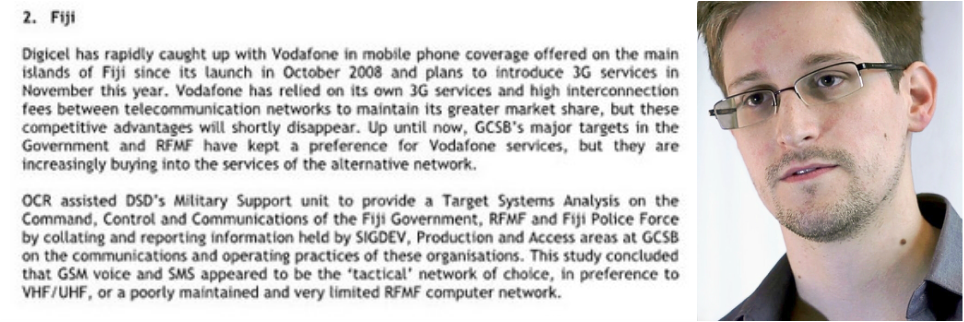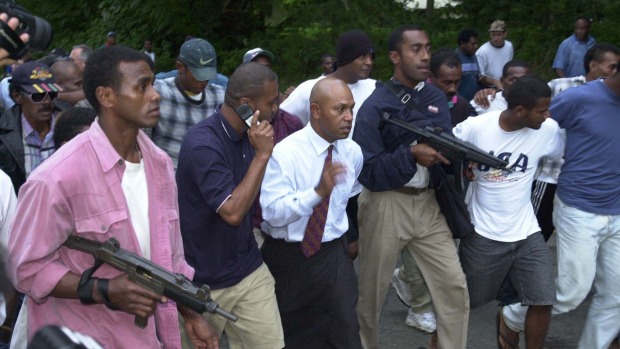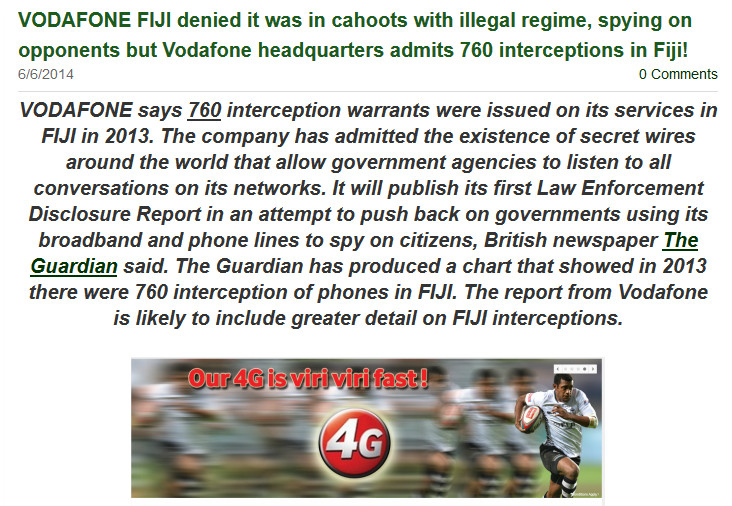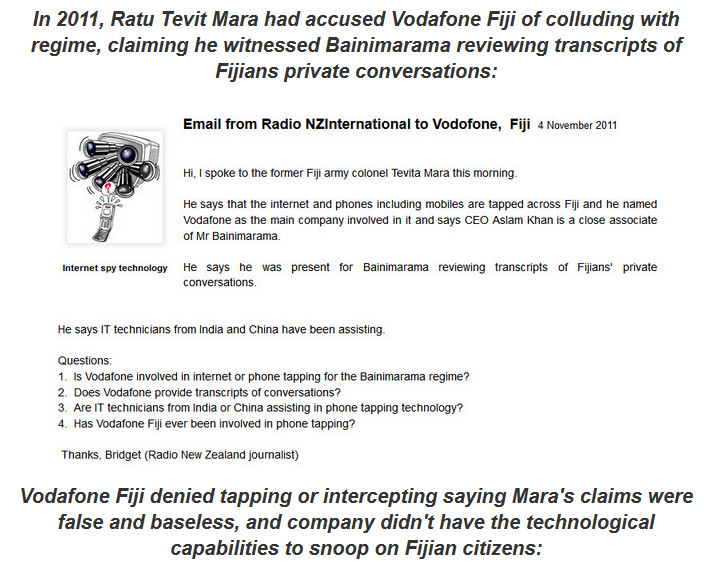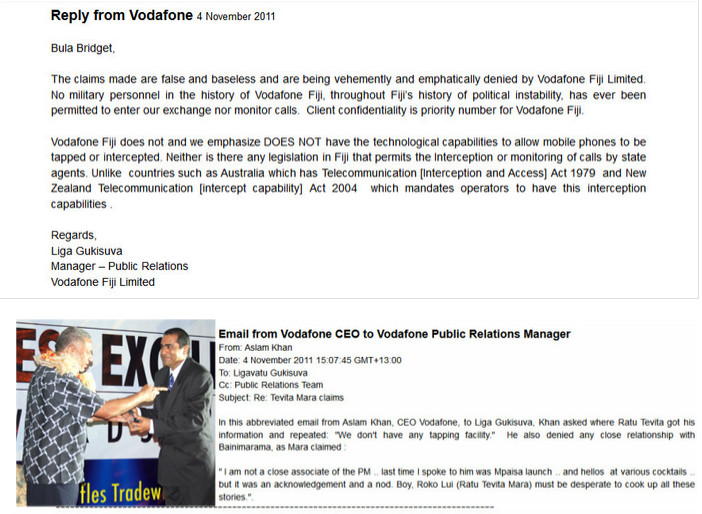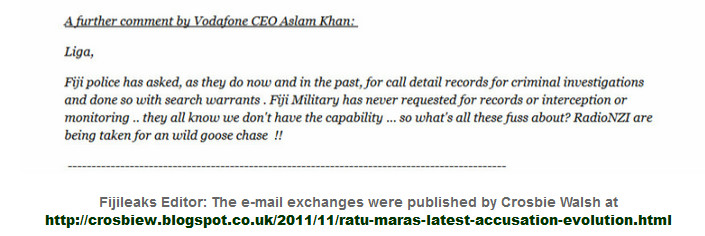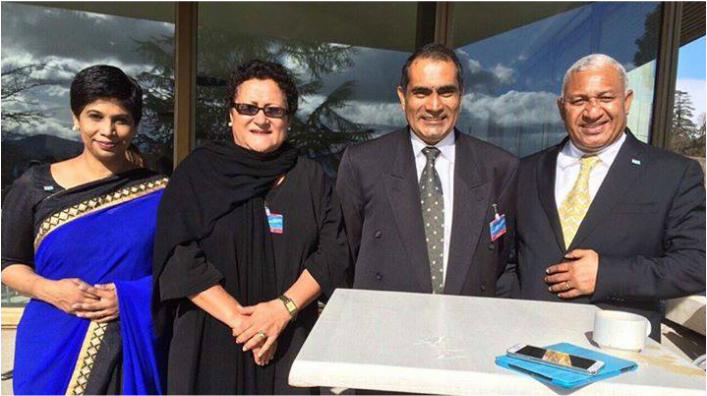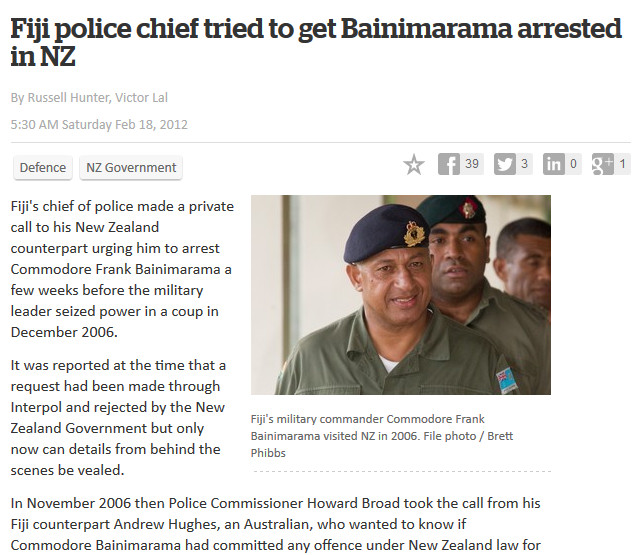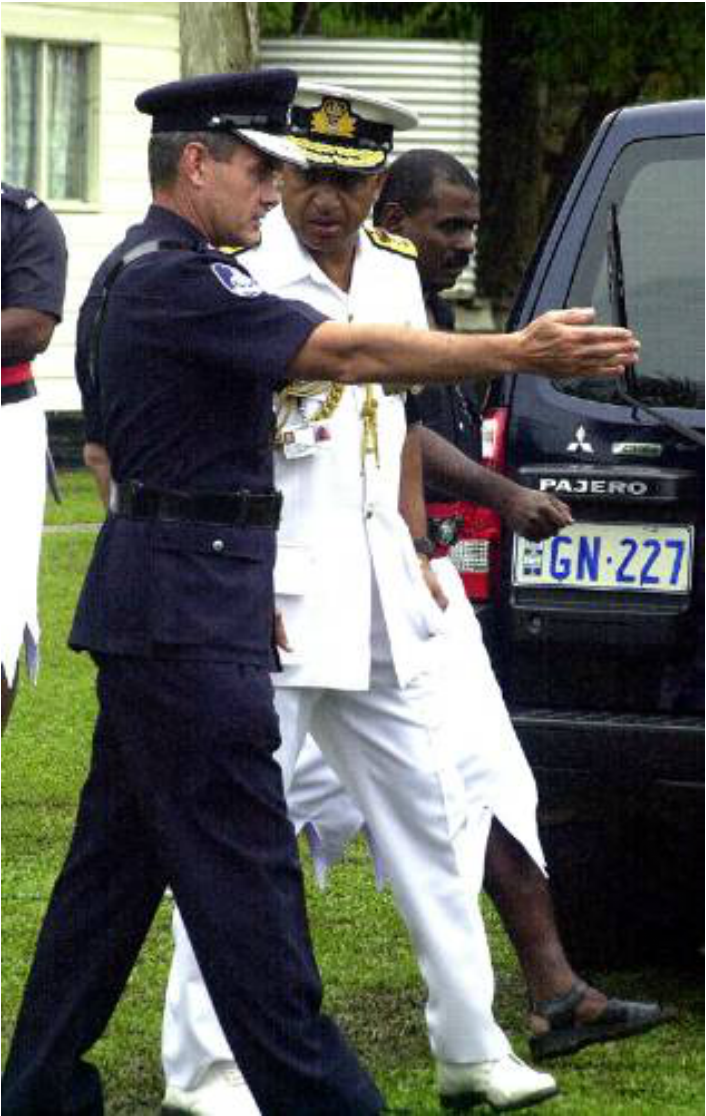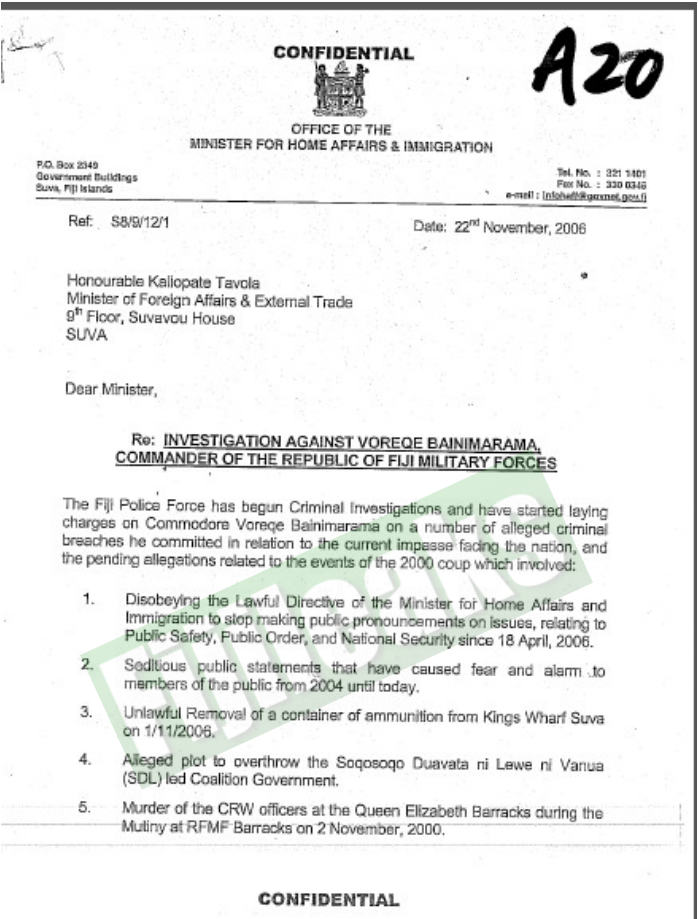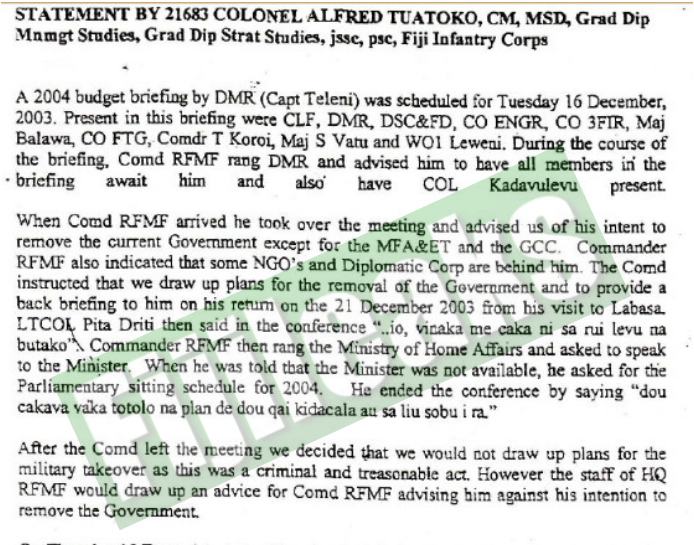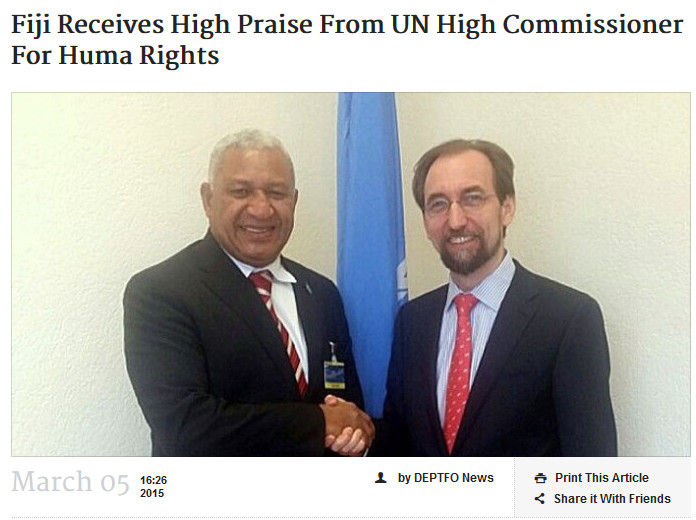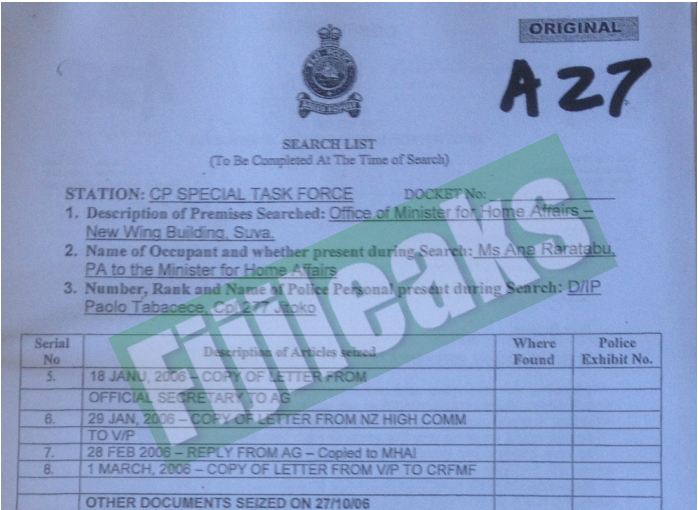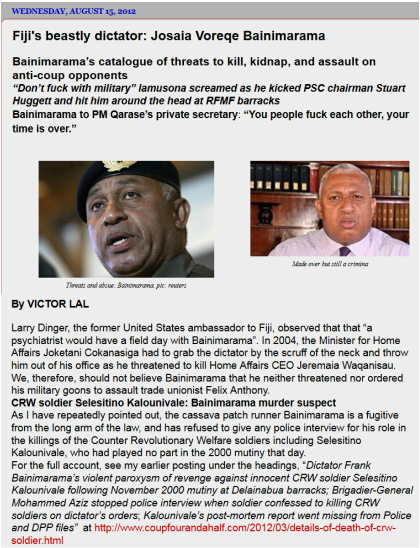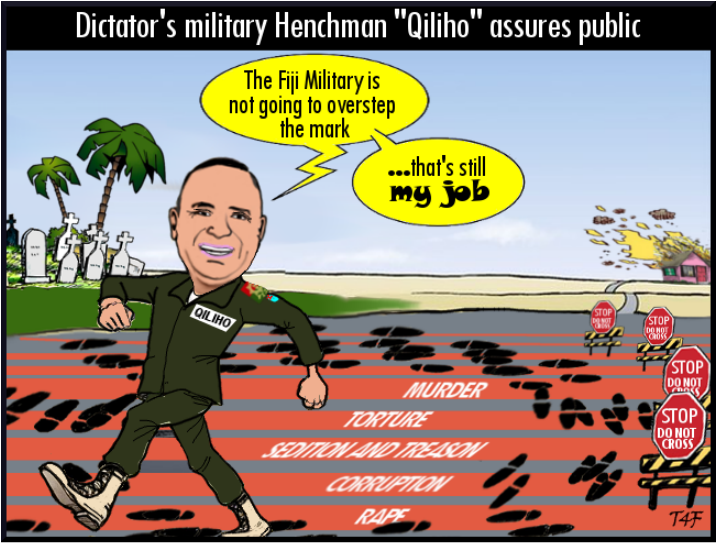New Zealand has been listening in on Fiji's military, police and government calls made on Vodafone but is slipping because major players switching to Digicel; the RFMF computer network very limited and poorly maintained - Snowden Files
The secret papers, published by the New Zealand Herald, show that the New Zealand Government Communications Security Bureau (GCSB) collects phone calls and internet communications in bulk in the region at its Waihopai Station intercept facility in the South Island.
Since a 2009 upgrade, Waihopai has been capable of “full take” collection of both content and metadata intercepted by satellite, the documents showed. The data is then channelled into the XKeyscore database run by the US National Security Agency, where it also becomes available to agencies in each of the “Five Eyes” countries: the US, Britain, Canada, Australia and New Zealand.
A leaked NSA memo credits the GCSB with providing “valuable access not otherwise available to satisfy US intelligence requirement”.
The papers – published by the Herald as part of a joint reporting operation with New Zealand investigative journalist Nicky Hager and the Intercept website co-edited by Glenn Greenwald – echo similar revelations from the earlier Snowden documents showing that Britain and the US had been spying on friendly neighbours in countries in the European Union and Latin America.
The regional surveillance conducted from the base covers Tuvalu, Nauru, Kiribati, Vanuatu and the Solomon Islands. New Caledonia and French Polynesia, both French overseas territories, are also among the listed countries. Although Samoa, Fiji, Tonga and Vanuatu are named, much of their data is now transmitted via undersea cable links that are not susceptible to Waihopai’s intercept satellites.
The revelations are particularly likely to test relations between New Zealand and Fiji, the island nation headed by Frank Bainimarama, the army chief-turned-prime minister. Following elections in Fiji in 2014, the countries have moved towards resuming full diplomatic links for the first time since the military coup led by Bainimarama in 2006.
Andrew Little, the leader of the NZ opposition Labour party, said that while he accepted the need for security agencies to protect national interests, he was “stunned at the breadth of the information that’s been collected”.
In an interview with Radio New Zealand, Little said: “It doesn’t seem to be targeted around particular threats, whether there just seems to be a hoovering of all this information and supplying it to the United States. I can’t see that that’s within the security mandate of the GCSB.”
The NZ prime minister, John Key, refused to comment on the specific revelations, saying via a spokesperson: “The Snowden documents were taken some time ago and many are old, out of date, and we can’t discount that some of what is being put forward may even be fabricated.”
Key later told reporters: “Some of the information is incorrect, some of it is out of date, and some of the assumptions are just plain wrong. “We do have the GCSB and it is a foreign intelligence service, it does gather foreign intelligence that’s in the best interests of New Zealand and the protection of New Zealanders.” He said successive governments had used the GCSB to gather foreign intelligence. “Where we gather intelligence, particularly if a friend is involved, it isn’t to harm that country,” he said. “It’s often to support or assist them.”
On Wednesday, before the publication of the documents, Key said it was a “bizarre time to be coming out making the case that New Zealand either gathers and shares information or gets information from other intelligence agencies”, adding: “Well, of course we do, and we do that to keep New Zealanders safe. We’re in the situation where we’ve got Isil reaching out to cause harm to New Zealanders, I think New Zealanders would expect me to share information.”
A GCSB spokesperson refused to comment on “speculation”, telling the Herald: “Everything we do is explicitly authorised and subject to independent oversight.” The Samoan prime minister, Tuilaepa Sailele Malielegaoi, said he was not worried about the information in the documents. “I don’t have any strong feelings about the allegations of spying,” he said.
Hager told the Guardian the first stories contained “by no means the most dramatic revelations” from the New Zealand-related Snowden documents. “We spent months digging into the Snowden archive, writing lots of stories from them … We’re going to be spacing out stories over the next while based on some really interesting information,” he said.
The first New-Zealand-specific documents from the Snowden files were revealed by Greenwald in September 2014, when the journalist visited New Zealand at the invitation of Kim Dotcom, the internet tycoon sought for extradition by the US over alleged copyright-related offences. Greenwald then said the documents proved New Zealand had embarked on a mass surveillance programme called Speargun, which centred on a tap into the undersea Southern Cross cable, New Zealand’s primary internet link with the rest of the world.
Key responded by declassifying documents that he said showed the government had considered a programme for “mass protection”, but rejected the proposal. Greenwald’s allegations were “simply wrong” and “based on incomplete information”.
“There is not, and never has been, mass surveillance of New Zealanders undertaken by the GCSB,” he said. Key branded Greenwald “Dotcom’s little henchman” and “a loser”. Greenwald in turn called Key’s attacks “adolescent” and “reckless”. Key later acknowledged, however, that Snowden’s claim that internet data from New Zealand was easily accessible via XKeyScore “may well be right”, saying: “I don’t run the NSA any more than I run any other foreign intelligence agency or any other country”. - The Guardian
By MICHAEL FIELD:
New Zealand right to spy on Pacific Island neighbours
 Field
Field And dangerously surprising things like coups, civil war and mutinies happen, and they have a real and direct impact on New Zealand.
The Snowden Papers suggest spying in the South Pacific is something new, but the reality is that we have been spying on Pacific countries for decades.
Back in 1914 London asked New Zealand soldiers to invade German Samoa. We said yes, but asked if they could give us some details of German defences. London replied we would look it up in an encyclopaedia. These days acting like that is not on.
Time-shift to today and pick a Pacific country that suddenly finds itself with people being killed, buildings on fire and assorted bad people breaking into police armouries – as happened in the Solomon Islands. New Zealand's Special Air Service was on the way to save lives - what are they expected to do for useful intelligence, Google it? As open as Pacific states can seem to be, it takes specialist knowledge and focus to know who the real players are.
Mobile phone metadata does not provide that. In the late-90s the Solomons was still known as the "happy isles" but some astute people were picking up whispers about dangerous people, one in particular, the little known Harold Keke. No one was spying on him but later he became a murderous warlord. So was Francis Ona, an obscure farmer who closed down the world's biggest copper mine and sparked a decade-long Bougainville civil war. Much later into that civil war, New Zealand did a lot of spying there. We should have, because we were putting unarmed New Zealand soldiers on the ground.
The Snowden papers suggest we are massively collecting metadata across the South Pacific and sending it to the US. If this is the extent of the spying, then New Zealand's tragedy is that we are not really listening at all to the Pacific. So often we have been taken by surprise.
The only one that didn't surprise us was Voreqe Bainimarama's 2006 coup in Fiji - only because he flew into Auckland and told us two weeks in advance that he was staging a coup. Fiji's Sitiveni Rabuka surprised us in 1987 when he staged two coups and in 2000 in Fiji, the coup by George Speight and his band of traitors came as a complete surprise to New Zealand.
As the Speight coup went on, with politicians being held custody, few had a clear idea who was friend or foe. That became clear later, when the spies began listening to phones and collecting metadata across Suva. Surprising players emerged - some were seen publicly as friends of democracy and order – yet the intelligence showed they were secretly supplying arms to the rebels holding Parliament. A large chunk of Fiji's population live in New Zealand and more may come if things ever go bad again.
We need to be watching.
Prime Minister John Key has not specified the nationalities of the people on the anti-terror watch-lists, but it is notable that the big Security Intelligence Service raids in Auckland two years ago were on Fiji Muslims. Officially we love Samoa and see it as a model, but in 1999 a cabinet minister was assassinated in a plot organised by two other ministers. Had we been listening that might have been avoided because it was mostly organised over international phone lines.
Tonga is more than just a cute Polynesian monarchy. It used to sell its citizenship and passports to terrorists, and several times it provided flag of convenience to ships hauling al-Qaeda arms around the Mediterranean. It's become obvious that some Pacific politicians are more than ready to sell out their assets, and those of the region - Melanesia's forests and fish are being shipped off to China, and the next big game is undersea minerals. And then there are the money laundering and tax-haven operations.
Samoa might play indifferent rugby, but their off-shore banks reputedly hide billions for people who would rather not be known about.
We need to be aware of who is stealing what and many Pacific countries have neither the resources nor the will to look too closely.
In the late Cold-War 70s I worked in the Samoan prime minister's office and talked with assorted spooks and diplomats from the Soviet Union (one in particular who was later expelled from New Zealand), Israel, the United States, France and Britain.
Mostly the interest was in what their rival nations were doing.
Wellington's External Intelligence Bureau (which later morphed into the GCSB) wanted to know why a Chinese acrobatic troop had shown up in Apia and was drawing in most of the population.
Over a beer, one of New Zealand's "spies" and I contrived a Top Secret analysis of the way China was leveraging off Bruce Lee movies to win the hearts and minds of Samoans.
If Snowden is right, and we are spying extensively on the Pacific, then we should be asking next, why are we so often getting surprised?
We're not listening at all.
